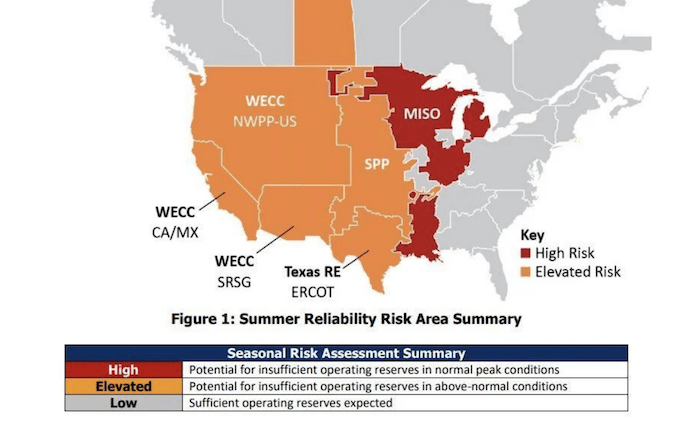Heat could test power capability

Monroe County residents may expect rolling blackouts or brownouts as energy-intensive summer months coincide with a potential shortage of power in the region.
Concerns come as the Midcontinent Independent System Operator reports that power could be limited into the near future.
MISO oversees the regional electric grid that covers a number of states from Minnesota to Louisiana. Southern Illinois Power Cooperative, which supplies power for Monroe County, is part of MISO.
Monroe County Electric Cooperative President/CEO Alan Wattles was among the first locally to suggest there might be a problem following news of several power plants in the MISO region shutting down.
“Coming into this summer, MISO gave a heads up to the northern portion of the states involved … that generation could be tight,” Wattles said. “We have seen several downstate coal-fired plants shut down and more are scheduled to be shut down. That’s gonna make things tight.”
Wattles said those shutdowns have largely been caused by environmental legislation. While the single shutdown locally will still leave MCEC long on power for two to three years, other concerns arise from shutdowns throughout the MISO region.
Wattles added that a shortage of power means that deficit might have to be made up with imported power and the infrastructure – namely transmission lines – necessary for that won’t be built for at least a few years.
Concerns about lack of power also come as high early summer heats arrive, leading to many households using their air conditioning heavily as they try to keep cool. That kind of power usage can be taxing on energy infrastructure.
“If we would have a full summer of this 97-100 degree temperature for 2-3 months, you very well could see some rolling blackouts or brownouts to preserve the grid reliability,” Wattles said.
Waterloo Director of Public Works Tim Birk said residents of his city could be less likely to experience rolling blackouts due to Waterloo supplying its own power, but they are still possible.
“The City of Waterloo is a little more sheltered because we have our own power plant,” Birk said. “But the capacity of our city equals the power generators at our power plant so everything would have to run perfectly. We would not experience those blackouts or brownouts if everything runs perfectly, and that’s our goal.”
For many, a temporary blackout or brownout is merely an inconvenience, but for others – especially in intense heat – a lack of cooling and power can be far more serious.
Birk said the Monroe County Health Department has set up cooling centers for this reason in the past. He also suggested Waterloo City Hall could be utilized similarly given board approval.
There can also be major consequences for local farmers should they lose power for an extended time this summer.
The Illinois Farm Bureau, through a partnership with the Illinois Press Association, brought up these concerns in a recent article where State Rep. Charlie Meier of Okawville, who raises beef cattle, voiced the possibility of his livestock going without water or fans in the event of a blackout.
Another major concern is for those with medical equipment that require constant power. Wattles suggested that individuals with such needs might want to consider investing in a personal generator for their home.
“Let’s say there’s medical needs to have power,” Wattles said. “Those folks need to think about getting a backup generator for the house and being able to have some form of electric to be able to continue to keep their medical equipment on.”






